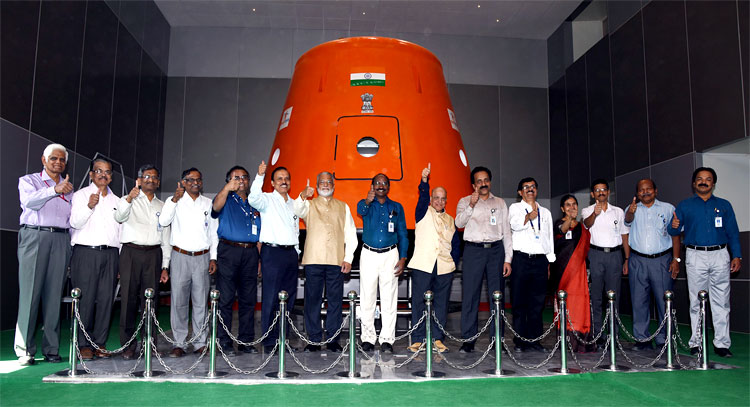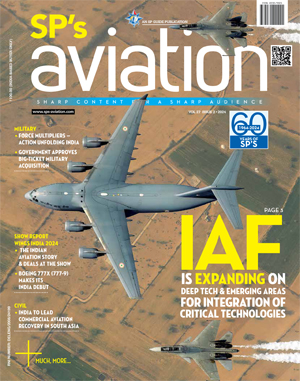INDIAN ARMED FORCES CHIEFS ON
OUR RELENTLESS AND FOCUSED PUBLISHING EFFORTS

SP Guide Publications puts forth a well compiled articulation of issues, pursuits and accomplishments of the Indian Army, over the years

I am confident that SP Guide Publications would continue to inform, inspire and influence.

My compliments to SP Guide Publications for informative and credible reportage on contemporary aerospace issues over the past six decades.
Space Policy and Gaganyaan
 |
The Author is Former Director General of Information Systems and A Special Forces Veteran, Indian Army |

India’s big mission of the maiden human spaceflight ‘Gaganyaan’ is on course to be launched by or before 2022 wherein the country will send two to three astronauts to space. Despite India having the first case of COVID-19 in January, India sent the four Indian Air Force (IAF) pilots to Russia in early February to train at Russian space facilities for the Gaganyaan mission. These four astronaut candidates currently at Moscow have resumed theory classes and physical training for their maiden human space flight. They resumed training on May 12 at the Gagan Research & Test Cosmonaut Training Centre (GCTC).
With success of ASAT and Gaganyaan mission on course, India’s space programme has been growing in accordance with the country’s requirements. Our space programme aims to ensure India is in sync with developments in the world including developing advanced technologies that benefit mankind and the society. ISRO has ensured its space assets benefit the public, which is the strength of India’s space programme. India has so far had 73 mission launch vehicles and has launched 104 satellites of its own since the beginning of its mission, out of which 48 are still active. In last five years, ISRO has earned over 1,245 crore by launching satellites for 26 different nations. NewSpace India Limited (NSIL), ISRO’s commercial arm is a Central Public Sector Enterprise of Government of India, was established on March 6, 2019. The main objective of NSIL is to improve private industry participation in Indian space programme. ISRO’s transfer of satellite building technology to the Indian private sector was demonstrated by the successful launch of a consortium-manufactured navigation satellite. In November 2019, ISRO’s commercial arm NewSpace India Ltd had called for Expression of Interest (EoI) from domestic private sector to make five Polar Satellite Launch Vehicle (PSLV) rockets. The first private consortium-built version of the PSLV was expected to be delivered and launched in 2020.

US President Donald Trump signed an executive order on May 6, 2020 establishing US policy on the exploitation of off-Earth resources. It stressed that current regulatory regime (1967 Outer Space Treaty) allows use of such resources. It can be assumed that other nations exploring space would do the same. Mining the Moon will reportedly help human travel further in space, to places like Mars; Moon can be intergalactic fuel station with resources like hydrogen and oxygen needed for rocket fuel. China is set to launch a Mars mission in July which included a rover landing on Mars surface. India too is seized with the issue of mineral mining in space as future game-changer, potential benefits of mining the moon and asteroids, as also space-based solar power. Plans are reportedly under discussion to mine Helium-3 in space, generate energy and transport it back to earth. According to western researchers 25 tonnes of Helium-3 could power the US for one full year. Space-based weapons are a reality, as experienced by China when the city of Tianjin was hit in August 2015. Aside from hypersonic platforms and missiles, capturing satellites and turning them into weapons is no more fiction: hackers commandeered US-German ROSAT satellite in 1998 and burnt its batteries by aiming the solar panels at the sun; hackers took control of UK’s SkyNet satellites for ransom in 1999, and; two NASA satellites were hijacked in 2008 albeit only for few minutes only. There are media reports indicating that in 2018 Chinese hackers launched a campaign aimed at satellite operators and defence contractors. This proves that satellites can be hijacked, killed, forced to crash to earth, and commanded to target originator’s critical infrastructure by jamming or spoofing the signals. There are no international regulations for satellites in space and even if there were, they could hardly be enforced. This assumes importance with China’s hacking proficiency and where we have dedicated military satellites.
Finance Minister Nirmala Sitharaman stated in a press briefing on May 16 that future projects for planetary exploration and outer space travel will be open for private sector. She added that startups and private firms can use indigenous geospatial data using strict guidelines instead of seeking it from abroad, and government will provide predictable policy and regulatory environment to private players. This will improve economic activity in the space sector and attract more investment. Till now, ISRO was providing limited access of its imagery through ‘Bhuvan’, which may be eased further but its extent by way of latency and whether this will be free or on payment will be clear only after implementation instructions are issued. Similarly, how will the access to ISRO’s launch pads for private players get regulated for launching their small satellites, and at what cost? Considering the importance of IT or biotechnology parallel to the space sector, there is a view that government should permit private sector to conduct businesses independently rather than being dependent on ISRO; encouraging private sector as full satellite integrators and service providers in established value chains like DTH operators. Government could take a call on this considering ISRO’s satellite technology and facilities plus orbital slots will be involved. Similarly, decision is needed whether startups can acquire new products and services from ISRO to help them attract investments. Finance Minister Sitharaman talked of strict guidelines for private players accessing geospatial data and provision of predictable policy and regulatory environment. But considering that space activities are multi-layered projects with plenty of intricacies across domains like gaining access to frequencies, licensing of satellites for operation, ability to export products, imagery etc, government could consider establishing an independent regulatory body to facilitate and monitor private sector participation in space activities. However, attributing the need for regulation only for geospatial data would be too simplistic a view.
Opening private companies to the space sector can be a critical security risk to the nation and the military if not handled properly. Technical intricacy of satellite building requires involvement of multiple manufacturers for making components. Similarly, satellite launch can involve multiple partners. Private companies owning satellites would naturally continue to outsource even after getting established in the space sector. Each additional vendor will increase the vulnerability to hackers. In addition, private companies themselves could be having FDI (including by China directly or through proxy). Therefore, foolproof system would be needed to guard against hackers exploiting multiple opportunities to infiltrate the system. Cost for private companies to ensure cyber-security of their satellites being high, they would tend to ignore it in interest of maximizing economic gains. Comprehensive cyber security will therefore need to be ensured.





